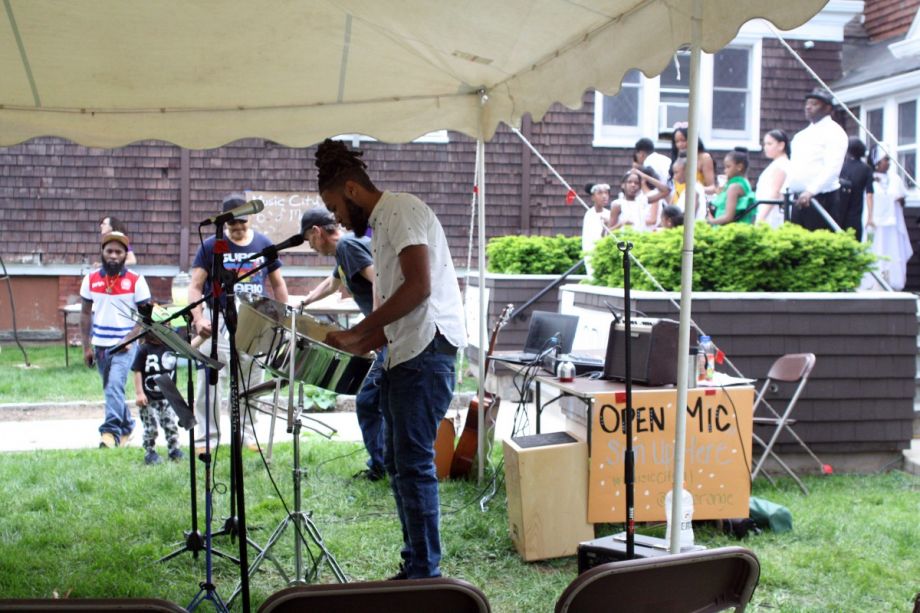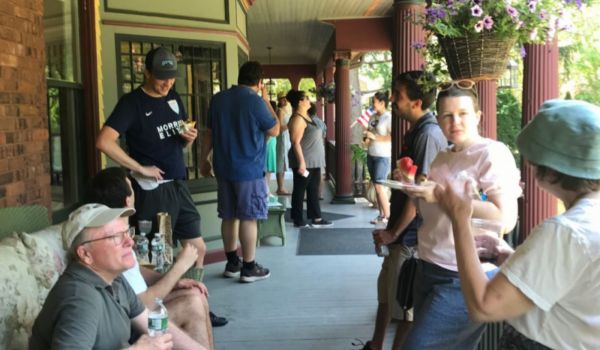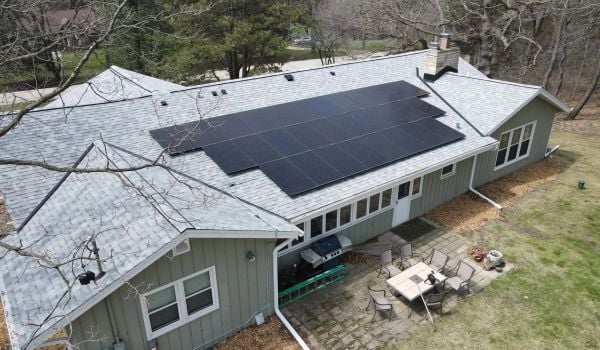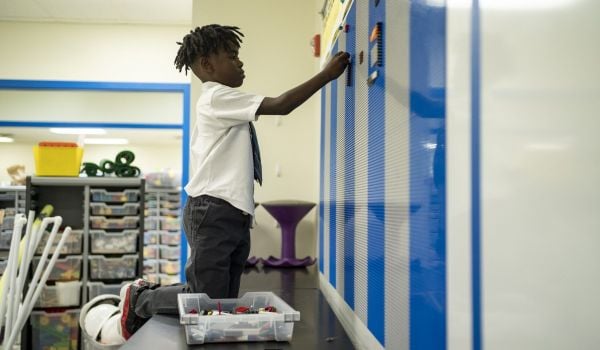At the University of Orange, a “free people’s university” in the city of Orange, New Jersey, the city is both the campus and the inspiration. Courses — all free and open to residents — range from music theory to urban placemaking. Each offering, ultimately, is a tool toward building “collective capacity for people to create more equitable cities,” as the website puts it. “We solve the problems of our world by learning to see the richness of our cities, becoming lifelong learners, participating in civic life, and having fun with our neighbors.”
That sentiment was on display one sunny Saturday afternoon this May, with University of Orange’s third annual Music City festival underway inside a church and adjacent rectory building. Performers played the steel drums, funk and acoustic guitar; children dressed in white danced to a drum circle and poets performed spoken word inside a cozy room with creaky wood floors. Doug Farrand, who helps organize the event, compares the festival to “playing in the family compound.”
Music City emerged from an earlier University of Orange event, held December of 2016, called “Remembering Rosa: A Concert for Peace.” In the wake of the presidential election, local performers including a gospel choir, high school marching band and harmonica player gathered to play in a school auditorium. University of Orange organizers recognized the event as “building social cohesion in a rather suddenly shifted political environment,” Farrand says.
And so they held the first annual Music City festival later that year, hoping to encourage more social cohesion through performance. University of Orange also built a Collective Recovery program to further create spaces and tools for people to gather, learn and heal together.
This chain of events highlights what University of Orange, which celebrated its 10th anniversary last November, does best: building informal educational spaces around current-day and urban policy issues, as a way to connect and empower the residents of Orange.
“It’s about activating a love and joy for your city as a part of your organizing and what you want to see in the future,” says Molly Rose Kaufman, the university’s cofounder. The university’s core urbanism principles, she explains, include acknowledging and fighting racism, keeping the whole city in mind, understanding “there’s never nothing there” and that “everything we need is already here.”
University of Orange grew out of celebrations in 2007 of the 50th anniversary of the fight to desegregate schools in Orange, a campaign spearheaded by Kaufman’s grandparents. Kaufman’s mother, Mindy Thompson Fullilove, is a psychiatrist focused on how social and environmental factors affect the mental health of communities. Thompson Fullilove left Orange as a teen, but returned in adulthood to pick up organizing work.
Mother and daughter envisioned the university as a way to connect local residents to each other and to empowering urbanist principles with the hopes of encouraging the next generation of city leaders.
The urbanist framework was based off Thompson Fullilove’s work, which ranges from a historic documentation of urban renewal and its impact on minority communities to ways of healing and bringing joy into divided American cities. Courses and events from the University of Orange revolve around similar things: learning the history of American cities, including the effects of racist policies, as well as celebrating the resources of its residents.
A rotation of free courses are taught by volunteers, alongside urbanism programs designed by the university. Bilingual music theory, for example, was developed by volunteer musician Margaux Simmons and is University of Orange’s longest running class. The class includes two optional field trips and visits from local musicians.
The Community Musicology course goes further to connect music to the urban fabric. The course gathers scholars, musicians and residents of Orange to explore diverse cultures of the city through the international music offerings.
Other educational offerings are inspired by current events. This January’s urbanism intensive included a seminar, field trip, printmaking workshop, potluck, and volunteer opportunities based off the 400 Years of Inequality project, which marks the 400th anniversary of the first Africans sold into bondage in North America.
Throughout its offerings, University of Orange emphasizes civic participation. “Graduation requirements are to take two courses, volunteer, have fun with your neighbors, attend a city meeting, and vote — though it doesn’t need to be in a governmental election,” says Kaufman.
The importance of storytelling is another important focus. Between 2014 and 2017, university co-director Aubrey Murdock led the creation of Hidden Treasures of Orange, which records resident’s stories of the city to shape conversations about Orange’s future. “Orange is full of stories, histories and ideas,” Murdock says. “We saw this as a way to put all of our urbanism principles into action.”
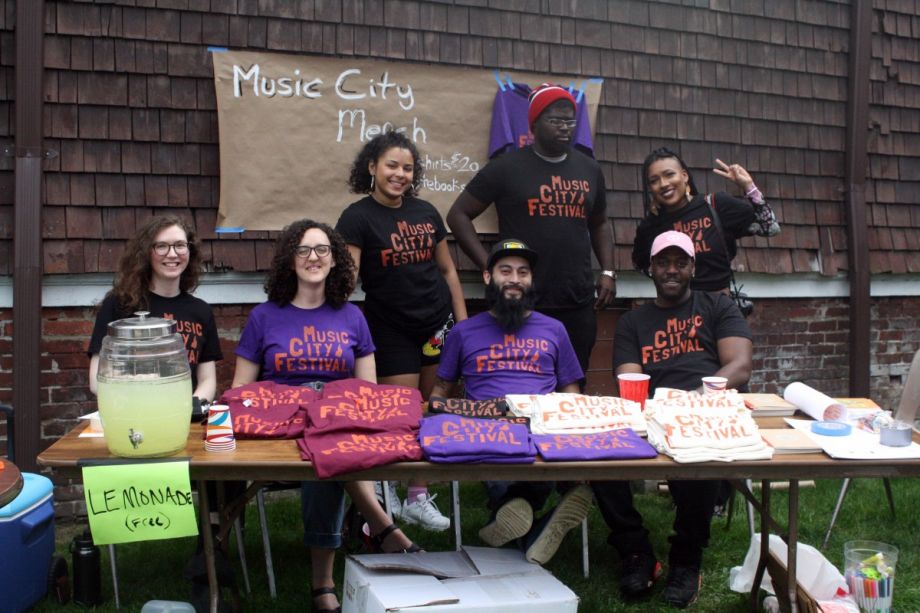
(Photo by Emily Nonko)
Farrand, who moved frequently as a child, was drawn to the place-based community building the university focuses on. He believes the nontraditional educational setting is a powerful tool to bring together residents from longtimers in Orange to newer arrivals like himself. “It’s coming into a place where learning is unshackled,” he says. “You’re exposed to an educational space without so many pressures and priorities that get imposed on it.”
Organizing the Music City festival, to him, was an opportunity to “grow musical wealth in Orange from the bottom up.” Rather than celebrating a big-name headliner, he says, the idea is to showcase the diversity of musical talent already in the city.
Music City was well-staffed with volunteers who sat at the welcome and merch tables, introduced musicians and answered questions from visitors. Volunteer hours power much of University of Orange’s programming, according to Kaufman, alongside a variety of funding sources from fundraising to arts grants.
The university’s urbanism department also consults; one current collaboration is with Newark-based Hector Design to create a youth-centric neighborhood plan in Detroit.
While University of Orange offers assistance for other cities to understand placemaking and urbanism-based education, the goal is not to replicate the university in another city. “It’s important for us to share our principles and approach,” Kaufman says, “But it’s because of the people who were here, and how people were thinking 10 years ago, that this grew to start a university of the city.”

Emily Nonko is a social justice and solutions-oriented reporter based in Brooklyn, New York. She covers a range of topics for Next City, including arts and culture, housing, movement building and transit.
Follow Emily .(JavaScript must be enabled to view this email address)

